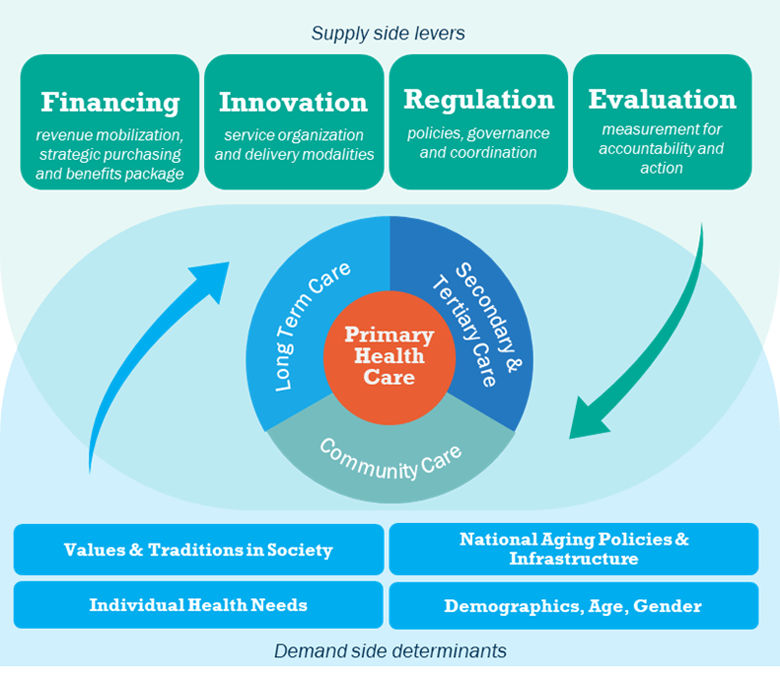Objective
This book launch will provide stakeholders with the overview of the report Silver Opportunity: Building Integrated People-Centered Care for an Aging Population, which will be published from Health, Nutrition, and Population, Global Practice, World Bank. The book is the first of the two analytical products under the PHRD UHC-funded analytical program: this book builds on global evidence whereas the second part will present curated country case studies. This book provides a road map and recommendations for policy actions.
for governments to close health gaps, improve senior health, and create prosperity for their people. This time, we will introduce the key findings from the global report, and a synopsis of the case study focusing on Japan, and generalizable lessons.
Japan Policy and Human Resources Development Fund (PHRD) UHC Window
The PHRD UHC program was established in 2016 to build on the recommendations of the Ise-Shima G7 Summit to promote UHC in developing countries; and incorporate the findings of the GoJ-WBG study. The program aims to provide analytical and advisory support to help low- and middle-income countries (that have strong potential to improve policies and promote UHC) to develop and implement strategies and capacities to adopt, achieve, and maintain UHC.
Book description
We live in a rapidly aging world, in which people who are 65 years and older outnumber children under age 5. This book reveals large and growing elder care gaps in countries at all income levels and shows how they can close these gaps and leverage reforms to improve the health of seniors and create healthier, more prosperous communities. It argues that primary health care (PHC) should be the cornerstone of integrated service delivery for older people, but that PHC systems must first build their capacity to respond to older people’s health needs. Aimed at policy makers and other health and development stakeholders who want to promote healthier aging, this book compiles the latest evidence on care needs and gaps for aging populations; presents an original framework for policy action to advance PHC-centered, integrated senior care; documents the experiences of pioneering countries in delivering community-based care to older people; and provides recommendations for decision-makers. The framework presents four policy levers to improve health care for seniors—financing, innovation, regulation, and evaluation and measurement—or FIRE. The FIRE framework identifies financing strategies countries can use to adapt their health systems as populations age by, for example, strengthening PHC gatekeeping and care coordination functions. It describes how some countries have leveraged innovative care delivery models—including digital technologies—to advance the full range of acute, post-acute, and long-term care services. Country experiences show that care systems for older people work best when countries adopt a whole-of-government regulatory framework across such domains as government stewardship, financing, human resources, and infrastructure. Finally, evaluation and measurement are key to understanding older people’s care needs and ensuring that the supply of services matches demand. By acting now, countries can leverage population aging to accelerate progress toward health equity and Universal Health Coverage (UHC).
The FIRE Framework
The project proposes a framework for transforming the system so that it can meet the needs of the older adults while providing care for the general population.
The frameworks anchors at better understanding from older adults’ needs. Older adults needs are constantly changing, and their preferences can be jointly influenced by individual health care needs, national aging care policies and infrastructure, and values and traditions in the society. Care preference also vary by demographics.
The health care system needs to address an expanding aging population’s complex need. Preparing the heath system and beyond for an ageing population is not only to provide better care for the older adults, but also strengthen the health system to be more effective to address the current and future challenges. The primary health care system is particularly well positioned to play a vital and unique role in addressing older adults’ diverse physical health, behavioral health, and social needs across the life course. However, major care gaps and structural barriers inhibit the primary health care system in its current form from meeting older adults’ needs. To optimally serve older adults, the primary health care system will not only need to be prepared to deliver point of care, but also have strong linkages with nursing homes, long term care, and the secondary and tertiary care. This requires that the primary health care system adept at both managing and coordinating care for an array of health experiences.
The overall guiding principle for the people centered coordinated elderly care is the FIRE framework – Financing, Innovation, Regulation and Evaluation (see Figure 1).
Contact
Kyoko Tokuda (ktokuda@worldbank.org/+1-202-938-8514), Operations Officer, Health, Nutrition and Population Global Practice, World Bank






